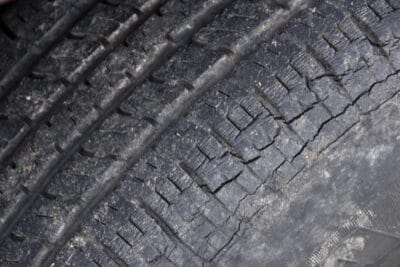Tire dry rot is usually spotted in the spring and summer, but the problem begins in the fall and winter. Take care of your RV now, and it’ll treat you right later. Hibernate right, and don’t neglect your tires!
There’s more to winterizing your RV than pumping antifreeze through your water lines. Protect from mold. Store your RV carefully. And now … let’s talk about your tires.
(P.S. No, I’m not concluding this article with a recommendation for a tire protectant. I don’t use them myself, and I don’t know of any bona fide tire engineers who vouch for them. Instead, they will tell you to keep your tires healthy, not to bandaid their boo-boos.)
What Is RV Tire Dry Rot?

“Dry rot” is a misnomer. Tires don’t rot like organic matter. It’s a molecular breakdown of the tire rubber. Here’s how retired tire engineer Roger Marble describes the problem: “The elastic properties of the rubber have been degraded over time, and when the rubber is flexed it cracks rather than stretches.”
So dry rot is the symptom, and the sickness lies underneath. Dry rotted tires are not as strong as new tires. Once the cracks burrow past the sidewall surface into the plies, the tire becomes susceptible to blowouts, air leaks, and tread separation – all the things that RVers hate.
Preventing tire rot isn’t as hard as it sounds. You don’t need a 10-step list; just listen to these three tips.
Secret #1: Use Your RV!
What causes tire dry rot? More than anything, it’s lack of use. Tires are naturally self-lubricating. In the same way that massaging your hair distributes shampoo to your roots, so rolling a tire distributes waxes and oils throughout the rubber. If you want your tires to last longer, drive more. During the winter season, try to drive your RV at least once a month for 10-15 minutes to warm up your tires.
Secret #2: Keep Away from the Generator!
Engines and generators create ozone. And ozone is to tires what Jacks are to giants. Floating a few thousand feet above us in the stratosphere, ozone (O3) wraps the earth in a protective blanket, but here at ground level, it’s a pollutant. It burns up tires from the inside out. If you want to keep your tires young and healthy, keep them away from generators and tailpipes.
Secret #3: Cover Up Your Tires!
Covering your tires protects them from four dangers:
- Oxygen (oxidation)
- Ozone
- UV light
- Heat
Oxidation
Oxidation is Mother Nature’s ticking time bomb. Eventually, oxygen and sunlight, the very things that keep life alive, will kill us all. Oxidation causes tires to become brittle and stiff, which leads to sidewall cracking. In layman’s terms, the tires dry out. By covering up your tires, you reduce the airflow, which reduces oxidation.
Ozone
Ozone isn’t all bad. It wraps the earth’s atmosphere in a protective blanket and keeps the Poles cold. But here at ground level, it mostly just hurts our plants and damages our tires. Ozone breaks down the molecular bonds in the rubber compound, chemically aging the tires. By covering up your tires, you reduce the airflow, which reduces ozone degradation.
UV Light
While ultraviolet light can’t penetrate inside the tire, it can do significant superficial damage over time. Thankfully, almost any tire cover does a good job at blocking UV light – and unlike tire protectants, tire covers don’t wear off.
Heat
“Thermo-oxidative degradation is accelerated with higher temperatures and is a contributing factor for tire failures,” says a summary report from SAE International. In layman’s terms, the hotter the weather, the faster the tire ages. Obviously, this is more a summer than winter problem. However, covering up your tires (best to use white covers) will reduce heat gain.
Bonus: Tire Protectants … Probably Don’t Matter
Dry rot strikes fear into the heart of any RVer. Companies know this. So some of the most valuable shelf space is reserved for tire dressings, tire protectants, tire cleaners, tire covers, ad nauseum.
I’ve never come across a study that showed tire protectants actually extend the lifespan of your RV tires. So I’ve neither endorsement nor condemnation. That’s not my wheelhouse. The science is clear that exposure to the elements and heat gain are the biggest tire-killers. Keep Mother Nature at bay; keep your tires healthy.
Leave a Reply